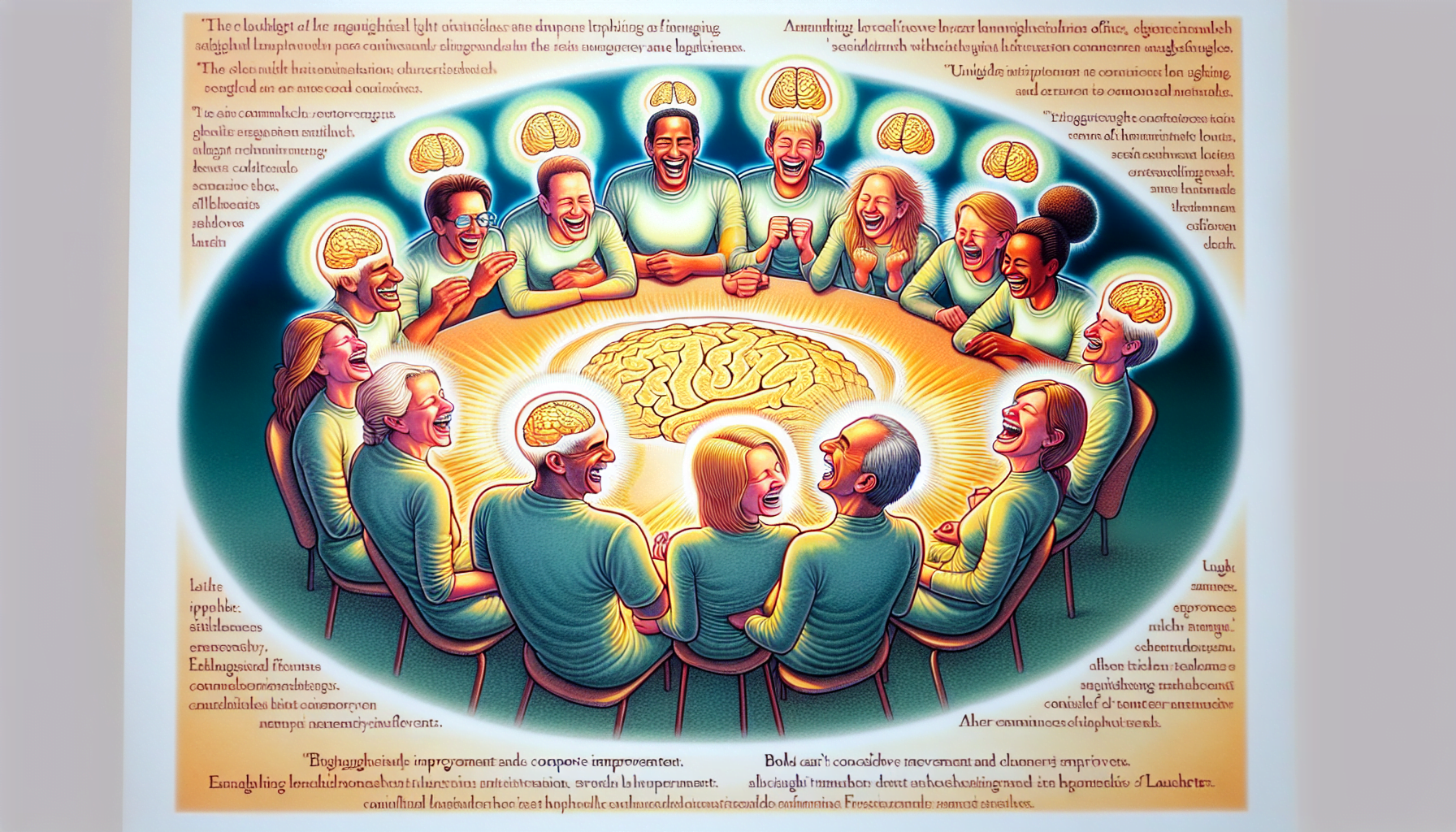Laughter is often called the best medicine, and there’s more truth to this adage than you might think. Beyond just a response to humor, laughter can have profound effects on our physical, mental, and social well-being, making it a powerful ally in the quest for a happy and healthy life.
Key Takeaways
- Laughter triggers the release of endorphins, the body’s natural feel-good chemicals.
- It can enhance mood, increase resilience, and improve quality of life.
- Laughter reduces stress, anxiety, and depression by decreasing stress hormones.
- It benefits cardiovascular health by improving blood vessel function and increasing blood flow.
- Laughter boosts the immune system by increasing immune cells and infection-fighting antibodies.
- It relaxes the body, relieving physical tension and stress.
- Cognitive functions such as memory and alertness can be improved through laughter.
- Social benefits include contagiousness, strengthening relationships, and improving teamwork.
- Laughter can shift perspective, reduce stress, and enhance creativity and problem-solving.
- Integrating laughter into daily life contributes to long-term mental health and a positive outlook.
Introduction to Laughter and Well-being
Overview of laughter’s impact on health
Laughter isn’t just a quick pick-me-up; it’s a complex response that involves many parts of the body. It can strengthen your immune system, boost your mood, diminish pain, and protect you from the damaging effects of stress. As simple as it sounds, the act of laughing can be a strong antidote to stress, pain, and conflict. Nothing works faster or more dependably to bring your mind and body back into balance than a good laugh.
Historical perspective on laughter as medicine
Historically, the benefits of laughter have been recognized for centuries. Ancient philosophers like Aristotle and Hippocrates wrote about the healing effects of humor. In more recent times, the idea of laughter as medicine has gained traction with the help of modern science, confirming what our ancestors somehow knew instinctively.

Psychological Benefits of Laughter
Release of Endorphins
Natural feel-good chemicals
When you laugh, your brain releases endorphins. These are the body’s natural feel-good chemicals that promote an overall sense of well-being and can temporarily relieve pain.
Temporary pain relief
The endorphin release that comes with a good laugh is so significant that it can actually cause something akin to a natural “high,” leading to feelings of euphoria and providing temporary pain relief.
Mood Enhancement
Improvement of emotional health
Laughter can improve emotional health by enhancing your mood and making you feel happier. It’s a powerful antidote to stress, conflict, and pain—both emotionally and physically.
Increase in resilience and quality of life
Regular laughter is associated with an increased sense of resilience and an improved quality of life, helping individuals better manage and bounce back from stressful situations.
Stress, Anxiety, and Depression Reduction
Decrease in stress hormones
Laughter reduces the level of stress hormones like cortisol and adrenaline, which in turn helps reduce stress, anxiety, and depression.
Enhancement of mood and self-esteem
By lowering stress hormones and increasing endorphins, laughter can improve mood and self-esteem, making it a valuable tool for combating depression.

Physical Health Improvements Through Laughter
Cardiovascular Health
Improved function of blood vessels
Laughter causes the tissue that forms the inner lining of blood vessels, the endothelium, to expand, which increases blood flow. This can help protect against heart attacks and other cardiovascular problems.
Increased blood flow and heart protection
The improved blood flow and function of blood vessels, which comes from a hearty laugh, is good for your heart and brain, two organs that require a steady flow of oxygen and nutrients.
Immune System Boost
Increase in immune cells
Laughter increases the number of antibody-producing cells and enhances the effectiveness of T-cells, leading to a stronger immune system.
Enhancement of infection-fighting antibodies
By boosting immune cells and antibodies, laughter improves your resistance to disease and can help you fight off infections more effectively.
Relaxation of the Body
Relief of physical tension and stress
A good laugh can relieve physical tension and stress, leaving your muscles relaxed for up to 45 minutes afterward.
Muscle relaxation duration
The act of laughing can relax your muscles, providing a physical release that can be both immediate and lasting, helping to keep the body in a more relaxed state.

Cognitive and Social Advantages of Laughter
Cognitive Function Enhancement
Memory improvement
Laughter, along with an active sense of humor, may help protect you against memory loss, as it engages multiple regions of the brain.
Increase in alertness
Humor and laughter also stimulate mental functioning and can increase alertness, creativity, and improve the ability to solve problems.
Social Benefits
Contagious nature of laughter
Laughter is contagious; it can bind people together and increase happiness and intimacy, which is beneficial in all social interactions, from the personal to the professional.
Strengthening of relationships and group bonding
Shared laughter is a powerful tool for managing conflict and reducing tension when emotions are running high. It’s also a powerful catalyst for building strong and lasting bonds between people.
Improvement in teamwork
In group settings, laughter can lead to better collaboration, trust, and teamwork, which are essential for effective working relationships and successful group dynamics.

Laughter as a Tool for Perspective and Creativity
Shift in Perspective
Realistic and less threatening view of situations
Laughter can provide a psychological distance from pain, sadness, and stress, allowing you to see situations in a more realistic and less threatening light.
Stress reduction through humor
A humorous perspective creates psychological distance, which can help you avoid feeling overwhelmed and diffuse conflict.
Creativity and Problem-Solving
Increased creativity
Laughter and play can trigger the imagination, inspiring you to think in novel ways and see things from a different perspective.
Enhanced problem-solving abilities
The mental flexibility that comes with humor and laughter can lead to better problem-solving skills and an enhanced ability to cope with challenges.
Integrating Laughter into Daily Life
Humorous Activities
Seeking out opportunities for laughter
To incorporate more laughter into your life, seek out fun activities, watch a funny movie, or spend time with friends who make you laugh.
Benefits of engaging in laughter-inducing activities
Engaging in activities that make you laugh can improve your emotional health, strengthen your relationships, and enhance your quality of life.
Long-Term Well-being
Contribution to mental health
Making laughter a regular part of your life can contribute to better mental health and help you cope with whatever life throws at you.
Development of a positive outlook on life
A good sense of humor can’t cure all ailments, but data is mounting about the positive things laughter can do. It can help you maintain a positive, optimistic outlook through difficult situations, disappointments, and loss.

Conclusion
Recap of laughter’s benefits
Laughter is a powerful antidote to stress, pain, and conflict. It’s free, fun, and easy to use. With so many health benefits, it’s no wonder that laughter is considered one of the simplest ways to lead a happier and healthier life.
Encouragement to embrace laughter in everyday life
So, the next time you find yourself bogged down by life’s challenges, remember to take a moment to laugh. It’s not just about brightening up your day—it’s about embracing a tool that can significantly improve your overall well-being.
Everything You Wanted to Know About Laughter and Well-being: Your Joyful Guide to Giggles!
How does laughter physically affect the body?
Laughter triggers a cascade of physical reactions in the body. It enhances your intake of oxygen-rich air, stimulates your heart, lungs and muscles, and increases the endorphins that are released by your brain. It can also lead to a decrease in stress hormones, reduction of pain through the production of natural painkillers, and may improve immune system functioning by increasing the production of infection-fighting antibodies.
Can laughter help reduce stress?
Absolutely! Laughter has been shown to reduce stress by lowering levels of cortisol, the body’s stress hormone. It also helps in relaxing the muscles, which can relieve some physical symptoms of stress. Chronic laughter may even improve the function of blood vessels and increase blood flow, which can help protect against heart attacks and other cardiovascular problems.
Does laughter have an impact on mental health?
Laughter is a powerful antidote to stress, anxiety, and depression. It improves mood, increases resilience, and can even help to improve one’s outlook on life. Laughter also promotes social connection, which is a key factor in maintaining mental health and coping with life’s challenges.
Is it true that laughter can boost the immune system?
Yes, some studies suggest that laughter can boost the immune system. It may do so by decreasing stress hormones, increasing immune cells and infection-fighting antibodies, thus improving your resistance to disease. Laughter may also release neuropeptides that help fight stress and potentially more-serious illnesses.
How does laughter affect social relationships?
Laughter is a universal language that helps to form and strengthen social bonds. It fosters emotional connections and can serve as a powerful tool for managing conflict and reducing tension when emotions are running high. Shared laughter is one of the most effective tools for keeping relationships fresh and exciting.
Can laughter improve my quality of sleep?
While direct research is limited, laughter may indirectly improve sleep quality by reducing stress and anxiety, which are common culprits of sleep disturbances. A good laugh before bed can also produce a sense of relaxation, aiding in a quicker sleep onset and potentially a more restful night’s sleep.
Is ‘laughter therapy’ a real thing?
Yes, laughter therapy, also known as humor therapy, is a real therapeutic approach that uses the natural physiological process of laughter to help relieve physical or emotional stresses or discomfort. It’s often used as a complementary treatment to promote overall health and wellness, sometimes in clinical settings such as hospitals or wellness centers.
How can I incorporate more laughter into my life?
Incorporating more laughter into your life can be as simple as watching a funny movie, reading a humorous book, or spending time with friends and family who make you laugh. You can also try attending a comedy club, participating in laughter yoga classes, or simply making it a habit to find humor in everyday situations.
Can forced laughter be as beneficial as spontaneous laughter?
Interestingly, the body can’t differentiate between forced and spontaneous laughter; both produce the same healthful effects. Forced laughter can eventually lead to genuine laughter and may provide the same benefits as natural laughing, such as stress relief and an improved immune system.
Are there any risks associated with laughter?
Laughter is generally a healthy activity with very few risks. However, it can pose problems for individuals with certain pre-existing conditions, such as certain types of hernias, heart disease, or severe respiratory issues. In rare cases, excessive laughter can lead to a short-term increase in heart rate and blood pressure or even laughter-induced syncope (fainting). It’s always best to consult with a healthcare provider if you have concerns about how laughter may affect your health.



